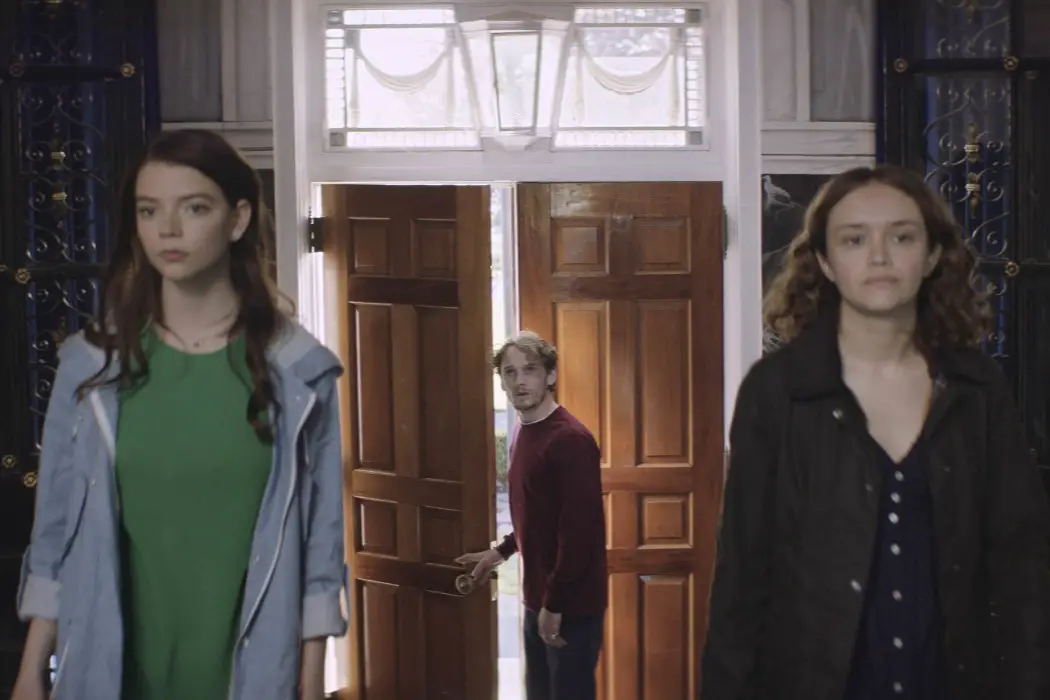Of Ennui & Animalia: American Boredom In THOROUGHBREDS & AMERICAN ANIMALS

Michael Colbert is a writer based in Portland, Maine. He…
Lily, Amanda, Spencer, and Warren are all a bit bored. School sucks. They’re not comfortable at home. Growing up isn’t easy. So they join the canon of bored white folks who look that boredom in the eye and try to make something of themselves, to actually do something. For all of them, their transgressions are violent.
Thoroughbreds and American Animals take up similar themes but with decidedly female and male focuses. In both, one friend, the more rebellious one, compels the other, weaker one, to act and to want to act of his or her own accord. They butt up against institutions that they feel oppress them intellectually.
American Animals Misses the Mark
American Animals takes us to Spencer and Warren in Kentucky. Spencer can’t find his niche, and Warren is at risk of losing his athletic scholarship. Together they drive around Lexington at night in their discontent. Once Spencer encounters Audobon’s The Birds of America in the university library, they plan a heist that gives them newfound purpose.

Spencer and Warren’s story is a bit obvious. Spencer gets hazed by a frat he rushes and comes home at night to draw sad, charcoal self-portraits. Warren’s parents are getting a divorce and he’s about to lose his athletic scholarship. He hasn’t showed up to practices or games because he just doesn’t see the point. So when Warren starts talking about stealing the book, Spencer, the more timid and conservative one, at first thinks it’s crazy but then can’t quite pull himself away.
For Spencer, the heist becomes sublime. Their fantasy of the perfect crime unfolds before us on screen. Spencer, Warren, and their partner Eric waltz into the library, painlessly taze the librarian, and with flourishes of cloth and jingling keys they steal the books, unscathed. Visual storytelling in this shot compels us to romanticize the heist, to see it as innocent, to remember they’re “only” stealing books from a library, so when everything does go wrong, the contrast is stark and we feel sorry for them.
American Animals asks us to sympathize with the boys throughout: even the framing around the story creates sympathy through raising doubts about what really happened. The film takes up questions of truth and narrative early on with intertitles that fade from “This is not based on a true story” to “This is a true story.” Interviews with the actual people behind the story cohere the film.
American Animals often seems to reach to points that are deep or funny but end up just being a bit obvious. Thus with the framing, more than a statement about truth, what emerges is a great deal of sympathy for these men. Between hearing each of them regret what they did and watching them feel trapped and lost at a bar, at the grocery store, while driving, we feel bad for them. And in the end, we have to ask why. The film doesn’t make any strong statements about class—there are thin references to it through Warren’s scholarship and Chas’s money—and the resulting message is one of discontented white men who feel oppressed by institutions that give them everything they could hope for.
Female Friendship in Thoroughbreds
Thoroughbreds, billed as American Psycho meets Heathers, follows Lily and Amanda, two Connecticut teens who feel everything and nothing respectively. As Lily reconnects with her childhood friend Amanda, the two explore Lily’s hatred for her stepdad and plot to kill him.

Where American Animals deals in the obvious, Thoroughbreds is much more opaque in its emotional register while still allowing for commentary on class and gender. For one, the film explores a strong, odd female friendship. Amanda’s candor pushes Lily to confront her strained relationship with her stepfather Mark, who has hunted lions somewhere in Africa, collected samurai swords in Japan, and who works out on his rowing machine above the living room just to drive Lily mad.
Together, they plot his murder, but their plans keep falling through until the end when Lily takes matters into her own hands. She drugs Amanda, slaughters Mark while he’s rowing, and smears the blood on Amanda’s arms before wrapping herself in them. The scene comes quickly and shockingly.
Like Spencer, Lily is cast as the more timid of the duo, and once Amanda falls asleep from the drugs, we wait to hear the rowing above them stop, to hear Mark fight back. Instead of glorifying the act like in American Animals, Thoroughbreds keeps the conflict off-screen and focuses on the relationship between the two girls. Though they fight against the patriarchy embodied by Mark, in the end we’re meant to ponder Lily and Amanda’s friendship.
The film still tells a story about white women, but it is self-aware and engages with the class they benefit from. The movie begins with Amanda wandering through Lily’s house and finding Mark’s hypermasculine trophies and the gaudy, overwrought interior design in their mansion. Similarly, after they enlist the help of Tim, who works at a nursing home and is one of the few people who their town’s wealth seems to have spat out, they bring him to Lily’s house to talk through their plan. Nondiegetic “Ave Maria” makes it quite clear that the money these girls have access to and the world they occupy is one that is ridiculous. Though we see their world through a man’s eyes in this scene, it ensures that this story engages with class.
What They Have to Say
If American Animals asks us to sympathize with disenchanted white men, Thoroughbreds follows a more complex route. Lily and Amanda’s friendship is nuanced and new, something we don’t see represented on screen often whereas one like Warren and Spencer’s has been done before (start with Fight Club and the list goes on). Though the film deals exclusively with whiteness, it brings in class and allows us to revile them for it, unlike romanticizing their wealth and their sadness for it, like so many stories of ennui lead us to do. But most importantly, the film gives us women with power. And women who are calculating, unemotive, and not on the verge of a nervous breakdown.
Does content like this matter to you?
Become a Member and support film journalism. Unlock access to all of Film Inquiry`s great articles. Join a community of like-minded readers who are passionate about cinema - get access to our private members Network, give back to independent filmmakers, and more.
Michael Colbert is a writer based in Portland, Maine. He loves horror film (his favorites are Candyman and Rosemary's Baby), and he’s a coffee addict (his favorites are Costa Rican and Ethiopian). His work has appeared in Avidly, Maine the Way, and Germinal.













